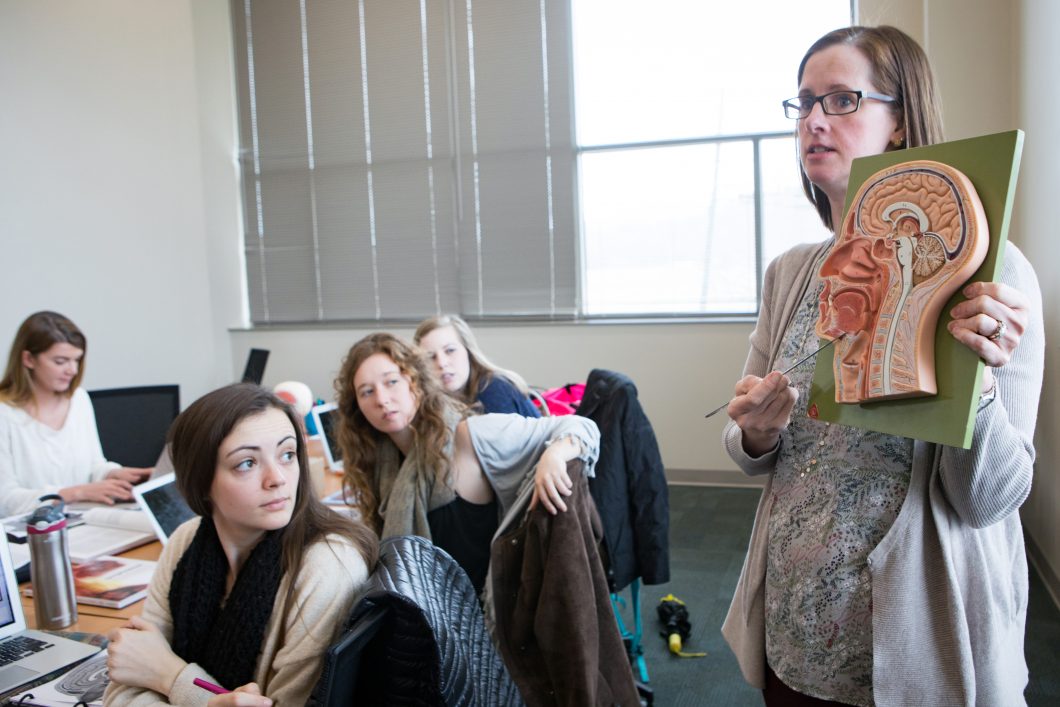Undergraduate research assistants can assist faculty with all stages of research projects, from generating project ideas and developing appropriate research questions, to preparing a conference presentation, to revising and resubmitting an authored publication.
As an assistant professor who teaches clinical courses for undergrad CSD students, I’ve had students serve as assistants in my lab in various roles. These students collected and entered data for research studies, assisted in writing abstract proposals for presentations, and purposefully worked to refine their professional communication skills while serving in my lab.
As their mentor, my goal is that my student research assistants learn to appreciate the importance of having a solid résumé and a polished letter of intent by regularly providing them with writing support as they prepare to apply for graduate school. Student researchers are also provided opportunities to observe clinical observation hours, to participate in research workshops, and to attend professional conferences to disseminate our work.
What Factors Do Faculty Consider When Selecting Undergrad Research Assistants?
When you consider seeking out an undergrad research assistant position, you should consider a few things. Here’s a peek inside what faculty may consider when deciding who to mentor in their research lab…
How Well Do You Know the Faculty Member?
Faculty receiving a “cold call” email from a student requesting an opportunity to work in their research lab may not automatically result in a research placement. There may be an application process if multiple students are interested or the faculty may not have a project currently underway that is appropriate for student researchers. Reading professor’s bios posted on your school’s website can help you knowing what type of projects are active in your department.
If you don’t know the faculty member, that’s okay! Schedule a meeting to talk with them about your goals for the research experience. Not only will they see if your expectations are the right fit for their research project, but they’ll also observe your interpersonal skills (e.g. response to feedback, problem solving, and emotional intelligence). Remember, faculty are looking for students who are truly interested in learning about the process of research and not just trying to “beef up” their résumés for graduate school.
Understand that faculty will most likely discuss your previous academic performance with fellow professors to get a better idea of your writing skills and professionalism to determine if you’ll be compatible in the lab setting.
Are You Interested in the Research Topic?
Seek out research opportunities for topics you’re interest in! This will keep your level of motivation high. If you don’t understand the research topic, you may not be helpful in sustaining the project or contributing to a thriving lab. Having an interest in the research topic not only helps you, it helps the lab, too.
Do You Have Realistic Expectations?
When students initiate conversations with faculty to “do research,” they often don’t understand the reality and longevity of the process. Many believe they’ll be creating their own projects and aren’t aware of the scope of their role. Often, students’ participation will be a small part of a larger, ongoing project. Because research can take a long time to complete, students may experience the research process at different points. This means you may rarely see a project through from start to completion. This is why it’s important if you think you may be interested in working in a research lab to contact the faculty mentor early (sophomore year is not too soon!) so you can gain more experience during your time in school.
Do You Have the Knowledge and Skills to Support the Research Project?
Depending on your year in school, you may or may not have studied the research topic yet. However, your knowledge of word processing, graphic design, social media, and data analytics could be beneficial. If you enjoy creative writing, you may find professional academic writing challenging. Keep in mind, having multiple students in a lab allow faculty to target each student’s individual strengths and assign lab tasks appropriately. So, these are all things to think about when considering undergrad research positions.
How Will Your Success Be Measured?
Talk to faculty about how they plan to measure the success of undergrad researchers. Will you have dedicated time to share the knowledge you gained? This may look like giving a presentation at a local, state, national, or international meeting. It may be creating a project that results in improved processes in a clinic, or establishing a training protocol for future students. Also consider if you’ll be invited into a discussion about authorship for any current or future publications that come from the lab.
Final Words of Wisdom
By asking to be involved in research early, seeking help when needed, and having a trainable attitude, you’ll increase your success at obtaining an undergraduate research position. Faculty want to encourage your success and will be happy support your efforts if you seek opportunities for research in a professional and sincere way.


Yes! Finally something about online colleges or universities.